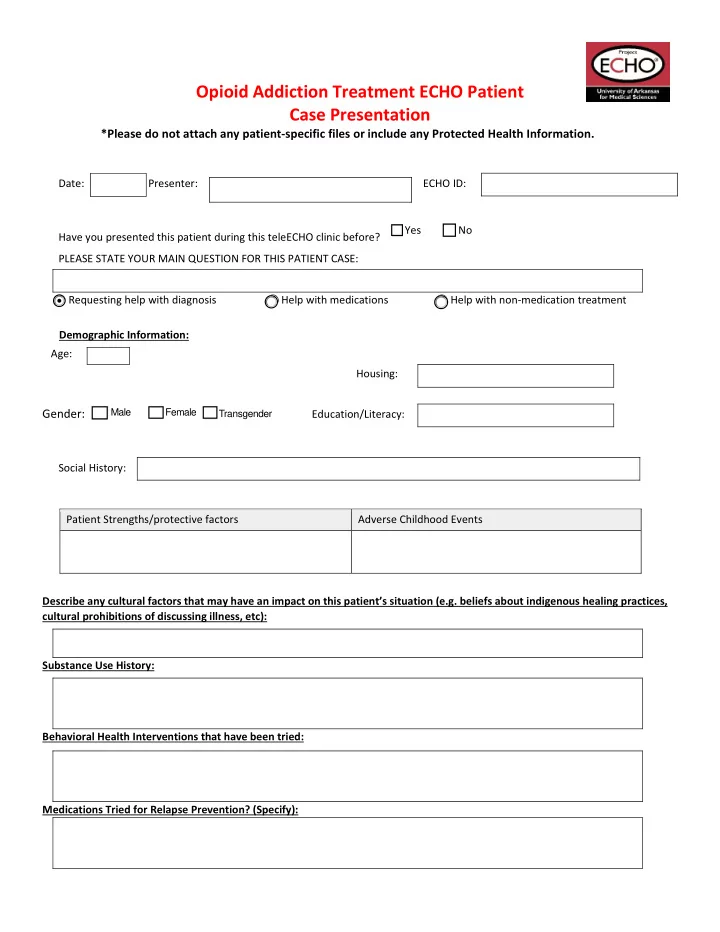

Opioid Addiction Treatment ECHO Patient Case Presentation *Please do not attach any patient ‐ specific files or include any Protected Health Information. Date: Presenter: ECHO ID: Yes No Have you presented this patient during this teleECHO clinic before? PLEASE STATE YOUR MAIN QUESTION FOR THIS PATIENT CASE: ⃝ Requesting help with diagnosis ⃝ Help with medications ⃝ Help with non ‐ medication treatment Demographic Information: Age: Housing: Gender: Male Female Education/Literacy: Transgender Social History: Patient Strengths/protective factors Adverse Childhood Events Describe any cultural factors that may have an impact on this patient’s situation (e.g. beliefs about indigenous healing practices, cultural prohibitions of discussing illness, etc): Substance Use History: Behavioral Health Interventions that have been tried: Medications Tried for Relapse Prevention? (Specify):
Labs (as indicated): Include last urine drug screen result DSM ‐ 5 Criteria Substance use Disorder Diagnostic Opioids (specific List other: (specific List other: (specific Criteria substances) substance) substance) (Must meet at least 2 criteria be met within a 12 ‐ month period) Meets criteria for Meets criteria for Meets criteria for SUD? SUD? SUD? 1. Substances often taken in larger Yes Yes Yes amounts/over longer period of time than intended. 2. Persistent desire or unsuccessful efforts to Yes Yes Yes cut down or control substance use. 3. A great deal of time spent in obtaining Yes Yes Yes substance, using substance, or recovering from its effects. 6. Continued substance use despite Yes Yes Yes persistent/recurrent social or interpersonal problems caused/exacerbated by the effects of substances. 7. Important social, occupational or Yes Yes Yes recreational activities given up/reduced because of substance use. Yes Yes Yes 8. Recurrent substance use in situations in which it is physically hazardous 9. Continued use despite knowledge of Yes Yes Yes persistent or recurrent physical or psychological problem that is likely to have been caused or exacerbated by substances. 10. *Tolerance, as defined by either: Yes Yes Yes A) need for increased amounts of substances to achieve desired effect. b)diminished effect with continued use of same amount of an substance 11. *Withdrawal, as manifested by: Yes Yes Yes (a)characteristic substance withdrawal syndrome (b) the same (or a closely related) substance are taken to relieve/avoid withdrawal symptoms American Psychiatric Association: Diagnostic and Statistical Manual of Mental Disorders, Fifth Edition. Arlington, VA, American Psychiatric Association,2013. Medical/Behavioral Health Diagnosis: Current Medications:
Prescription Monitoring Program Pertinent Findings: Proposed Diagnoses: Patient Goals for Treatment: Proposed Treatment Plan: By initialing here _______ you have acknowledged that Project ECHO case consultations do not create or otherwise establish a provider ‐ patient relationship between any ECHO clinician and any patient whose case is being presented in a teleECHO clinic.
Recommend
More recommend